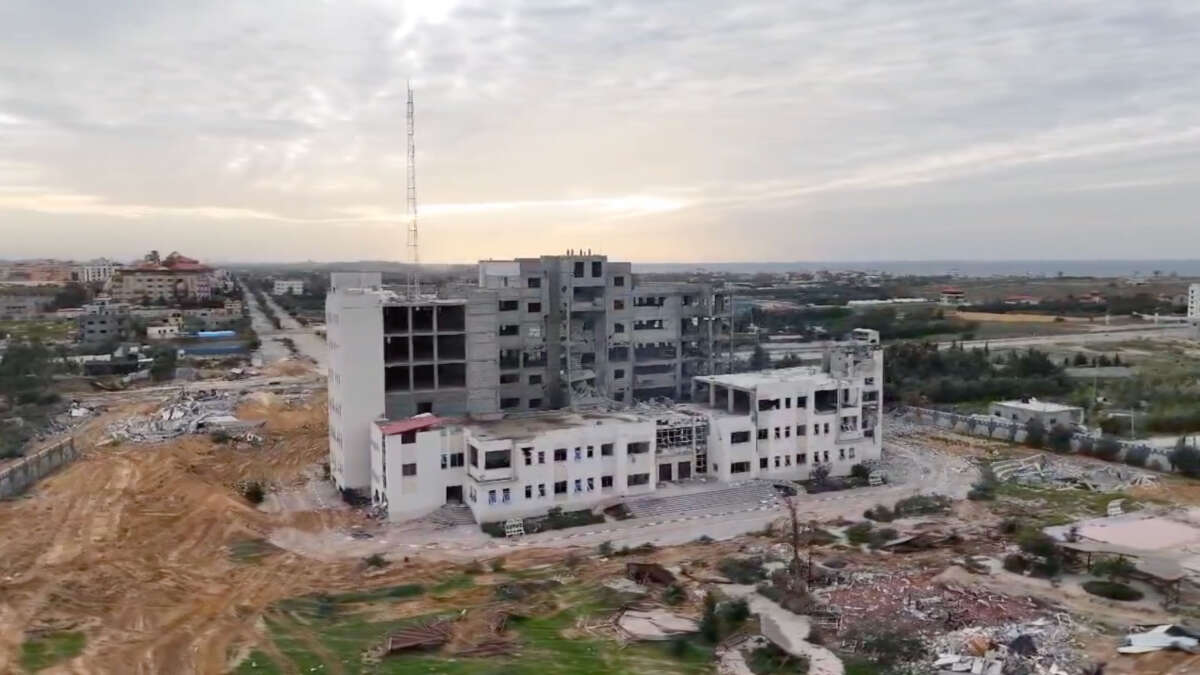Truthout is an indispensable resource for activists, movement leaders and workers everywhere. Please make this work possible with a quick donation.
The Israel Defense Forces’ detonation of more than 300 mines planted at Israa University in Gaza on Wednesday provided the latest evidence that Israel’s objective in its bombardment of the enclave is not self-defense, rights advocates said.
“This is not self-defense,” said Chris Hazzard, an Irish member of the United Kingdom’s Parliament. “This is not counter-insurgency. This is ethnic-cleansing.”
The International Middle East Media Center (IMEMC) called the destruction of Israa University Israel’s latest attempt to carry out a “cultural genocide” along with the slaughter of at least 24,620 people in just over three months — people who Israeli officials have claimed are legitimate military targets despite the fact that roughly half of those killed have been children.
The wiping out of cultural landmarks was included in South Africa’s International Court of Justice case accusing Israel of genocidal acts in Gaza last week, with the complaint noting that “Israel has damaged and destroyed numerous centers of Palestinian learning and culture,” including libraries, one of the world’s oldest Christian monasteries, and the Great Omari Mosque, where an ancient collection of manuscripts was kept before the building was destroyed in an airstrike last month.
“The crime of targeting and destroying archaeological sites should spur the world and UNESCO into action to preserve this great civilizational and cultural heritage,” Gaza’s Ministry of Tourism and Antiquities said after the mosque was bombed.
Now, international relations professor Nicola Perugini of the University of Edinburgh said, “all the universities in Gaza have been damaged or destroyed.”
The Israeli military just blew up the University of Palestine in Gaza City with 315 mines. All the universities in Gaza have been damaged or destroyed. We need a full academic boycott. pic.twitter.com/nNStUTBc9e
— Nicola Perugini (@PeruginiNic) January 17, 2024
On its Facebook page, the university said the IDF had occupied the campus for about 70 days before planting 315 mines and detonating the institution’s main building, its museum, a university hospital, and other buildings.
The IDF occupied Israa University, said administrators, “and used it as a military base for its mechanisms and a center for [the] snatching of isolated civilians in the areas of Rashid, Maghraqa, and Zahraa streets, and temporarily detained [them] to investigate with citizens before moving them.”
Mitchell Plitnick, president of Rethinking Foreign Policy, said the fact that 315 mines were detonated meant that “by definition… it was not a legitimate military target.”
“Israel would have to have full control to plant so many mines,” said Plitnick. “This is a clear example of a war crime and destruction for the fun of it.”
Eight universities in Gaza have now been targeted since the IDF began its bombardment on October 7, according to the IMEMC.
Birzeit University, in the occupied West Bank, condemned the destruction of the school and accused Israel of stealing 3,000 rare artifacts from Israa’s museum.
“Birzeit University reaffirms the fact that this crime is part of the Israeli occupation’s onslaught against the Palestinians,” said the school on social media. “It’s all a part of the Israeli occupation’s goal to make Gaza uninhabitable; a continuation of the genocide being carried out in Gaza Strip.”
A terrifying moment. We appeal for your support.
In the last weeks, we have witnessed an authoritarian assault on communities in Minnesota and across the nation.
The need for truthful, grassroots reporting is urgent at this cataclysmic historical moment. Yet, Trump-aligned billionaires and other allies have taken over many legacy media outlets — the culmination of a decades-long campaign to place control of the narrative into the hands of the political right.
We refuse to let Trump’s blatant propaganda machine go unchecked. Untethered to corporate ownership or advertisers, Truthout remains fearless in our reporting and our determination to use journalism as a tool for justice.
But we need your help just to fund our basic expenses. Over 80 percent of Truthout’s funding comes from small individual donations from our community of readers, and over a third of our total budget is supported by recurring monthly donors.
Truthout has launched a fundraiser to add 340 new monthly donors in the next 5 days. Whether you can make a small monthly donation or a larger one-time gift, Truthout only works with your support.
